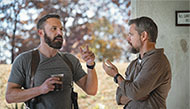
Francois Massau built three rotating houses around Wavre.
By JOHN TAGLIABUEWAVRE, Belgium - With energy prices rising, Francois Massau, a coal merchant-turned-builder who died impoverished and alone in 2002 at the age of 97, is enjoying a small measure of posthumous fame, though not here in his hometown.
In the 1950s, when few people talked about ecology or conserving energy, Mr. Massau built what was among the earliest revolving homes. He built it in 1958 so his sickly wife could enjoy sunshine and warmth any time of the day or the year.
Today, as energy prices soar, revolving buildings have become fashionable. In Germany, Rolf Disch has built a solarpowered rotating house; in Dubai, in the United Arab Emirates, David Fisher, an Israeli-born Italian architect, plans an 80-story rotating skyscraper . Some call it sunflower architecture.
The technology Mr. Massau pioneered was so effective that all three of the revolving houses he built remain operational. Yet on the 50th anniversary of his first house, there will be no ceremonies or honors.
Mr. Massau spent his later years unhappily, in court with government agencies and contractors seeking money he believed he was owed.
“He was always seen as eccentric,” said Guy Otten, a retired journalist who wrote about Mr. Massau. “He was never appreciated here.”
His first revolving house stands in a stylish neighborhood on a rise above Wavre. Its brick and concrete foundation is stationary, supporting a steel track on which the house revolves, moved by an electric motor.
“It’s the most beautiful house in Wavre,” said Dominique Quinet, who lives there .As a toddler, her daughter often played in the sandbox outside. “If I worked in the kitchen,” Ms. Quinet said, “I simply moved the kitchen to where the sandbox was, so I could keep an eye on her.”
The people of Wavre are divided in their view of Mr. Massau. Old photos from 1958 show local dignitaries, including the mayor, admiring his first house. The dignitaries brought admiration but no money. By 1968 Mr. Massau was forced to sell the house to Ms. Quinet’s father, Paul, to finance construction of more houses.
Paul Quinet also lent Mr. Massau money, hoping to be repaid when the houses were sold. “But he never sold them,” Ms. Quinet said. “My father had to go to court. Mr. Massau was not correct in his attitude. But then, he was not a businessman.”
Those who defend Mr. Massau say his was a typical case of the outsider crushed by the establishment.
“He was not an architect, he was not an engineer, he was not a builder,” said his grandson Philippe Willems, who lives in the second of Mr. Massau’s three houses in Malonne, a village south of Wavre. “He was a coal merchant, a mason. He sold everything to build his houses.”
스마터리빙
more [ 건강]
[ 건강]이제 혈관 건강도 챙기자!
[현대해운]우리 눈에 보이지 않기 때문에 혈관 건강을 챙기는 것은 결코 쉽지 않은데요. 여러분은 혈관 건강을 유지하기 위해 어떤 노력을 하시나요?
 [ 건강]
[ 건강]내 몸이 건강해지는 과일궁합
 [ 라이프]
[ 라이프]벌레야 물럿거라! 천연 해충제 만들기
 [ 건강]
[ 건강]혈압 낮추는데 좋은 식품
[현대해운]혈관 건강은 주로 노화가 진행되면서 지켜야 할 문제라고 인식되어 왔습니다. 최근 생활 패턴과 식생활의 변화로 혈관의 노화 진행이 빨라지고
사람·사람들
more
[한인단체 신년 인터뷰] KYCC 송정호 관장… “지역사회 위한 종합 서비스 강화”
LA 한인타운 대표 비영리단체 한인타운청소년회관(KYCC)의 송정호 관장은 “지금 우리가 하는 일은 커뮤니티 ‘니즈’가 있기 때문에 존재한다”…

[한인단체 신년 인터뷰] LA 평통 장병우 회장… “본연 역할로 한반도 평화 실질 기여”
민주평화통일자문회의 LA협의회(이하 LA 평통) 장병우 회장은 6일 본보와의 신년 인터뷰에서 붉은 말의 해인 병오년 새해를 맞아 신년 화두로 …
워싱턴주에 첫 한인 시의장
워싱턴주에서 첫 한인 시의회 의장이 탄생했다. 제이슨 문(한국명 문태원) 머킬티오 시의원이 새해 들어 시의장으로 선출되며 또 하나의 중책을 맡…
국회 방문단 대한인국민회 방문
윤후덕·이해식·김한규 의원과 조오섭 국회의장 비서실장 등 10여 명의 한국 국회방문단이 지난 5일 LA를 찾아 로즈데일 묘지와 국민회관 등 미…
[한인단체 신년 인터뷰] 명원식 파바월드 회장… …
“한인 차세대들이 바르게 자랄 수 있는 토대를 만드는 것이 제가 파바월드의 회장으로 존재하는 유일한 이유입니다”한인사회의 대표적 청소년 봉사 …
많이 본 기사
- “日, 하룻밤새 핵무장 가능”…10년前 바이든 발언 소환한 中
- 이란시위 통제불능…물가 불만이 순식간에 체제전복 뇌관으로
- FBI, 북한 ‘QR코드 피싱’에 경종… “김수키 새 해킹기법 ‘퀴싱’”
- 靑, NSC 실무조정회의 소집… ‘무인기 침투·격추’ 北 주장 대응
- 베선트 재무장관, 호주·인도 등 불러 G7 ‘핵심광물 회의’ 개최 예정
- ‘87세’ 전원주, 20세 연하男과 성수동 데이트.. “뻔뻔하게 잘해” 포옹까지
- 트럼프 “국제법 필요 없어, 날 멈추는 건 내 도덕성뿐”
- ‘총격 사망’ 하루 만에 또 유혈사태… ‘반트럼프’ 불붙나
- 미네소타, ‘ICE 총격’ 독자수사 … 4
- 베선트 재무장관 “관세 환급 판결 나오더라도 환급 자금 충분”
- “美·우크라, 8천억 달러 규모 ‘전후 경제재건’ 합의 예정”
- 웃거나 졸거나… 윤석열, 끝내 반성은 없었다
- 전두환 사형 선고받은 417호 대법정
- 미중, ‘휴전’ 태국·캄보디아 지원 경쟁…동남아 영향력 확대
- 미·덴마크, 수싸움에 ‘뜨거운 그린란드’
- 이용식, ‘가족과 절연’ 박수홍 챙겼다.. “어떻게든 갚으며 살 것”
- 광주·전남 통합 급물살 6월3일 단체장 뽑는다
- 그린란드 환심 사려나… 미, 주민 1인당 최대 10만 달러 ‘현금 살포’ 검토
- 이 대통령, 시진핑 이어 내주 다카이치 만난다
- ‘한미원자력협력 정부 TF’ 출범
- 올해 ‘2% 성장’ 내건 정부, K자형(양극화 현상)은 경계
- 트럼프 주택저당증권 매입 지시에 美주택대출 금리 3년만에 최저
- 한인사회도 ‘수퍼독감’ 비상… 타운 병원들 ‘북적’
- 트럼프 “그린란드 합의 안되면 힘든 방식으로라도 확보하겠다”
- 오염 지하수 처리 정화계획 의견 수렴
- 안규백 “계엄 악몽 엊그제인데…무인기 침투 北주장 사실 아냐”
- 연초 개인 자금, 미국 대표지수 ETF에 몰렸다
- 신봉선, ‘11kg 감량’ 다이어트 루틴 공개.. “아이유 같아”
- 美당국, 스페이스X 스타링크 2세대 위성 7천500기 추가 승인
- ‘재산 600억 설’ 이서진, 뼛속까지 짠돌이 근성.. “겨울에도 난방 NO”
- 목회자 및 가족수련회 개최
- 트럼프 “안전보장할테니 베네수 들어가라”…美석유업계는 ‘신중’
- “시민권 신청 안전하고 현명한 선택”
- 워싱턴 지역 ‘연방정부 일자리’ 7만2천여개 사라져
- 치매 위험 낮추고 뇌 보호 위해 해야 할 새해결심 8가지
- UC 캠퍼스 한인 재학생 역대 최다
- 논란 박나래 하차 ‘구해줘 홈즈’, 이상엽·최고민수가 채웠다..”엄청 긴장돼. 손에 땀이..”
- 트럼프 행정부, DC 교통단속 카메라 전면 금지 추진
- 워크숍 통해 ‘차세대 리더’ 역량 강화
- 오바마케어 보조금 확대 3년 연장안 … 1
- 정부, ICE 총격 파장에 맞불?… ‘미네소타 보조금 횡령’ 쟁점화
- [제11회 건강걷기대회@그리피스팍] “다함께 걸으며 건강·화합 챙기고 이웃돕기 동참”
- [역사속 하루] 1938년 1월 3일 소아마비극복재단 출범
- ‘액자형 TV’ 시장 진출… 아마존, CES서 첫 공개
- 尹 내란 재판 15시간 만에 종료…구형·최후진술은 13일에
- 韓,752만명 받는 국민연금 수령액, 이달부터 2.1% 인상
- VA 올드도미니언대 졸업생이었다
- 트럼프 “이란이 시위대 죽이면 아픈 곳 세게 때리겠다”
- ‘유령선단’ 한반도 주변서도 활개…제주해협 지나 동해서 환적
- CES에서 공개된 독특한 외형의 로보택시 ‘죽스’
1/5지식톡

-
 미 육군 사관학교 West Poin…
0
미 육군 사관학교 West Poin…
0https://youtu.be/SxD8cEhNV6Q연락처:wpkapca@gmail.comJohn Choi: 714-716-6414West Point 합격증을 받으셨나요?미 육군사관학교 West Point 학부모 모…
-
 ☝️해외에서도 가능한 한국어 선생님…
0
☝️해외에서도 가능한 한국어 선생님…
0이 영상 하나면 충분합니다!♥️상담신청문의♥️☝️ 문의 폭주로 '선착순 상담'만 진행합니다.☎️ : 02-6213-9094✨카카오톡ID : @GOODEDU77 (@골뱅이 꼭 붙여주셔야합니다…
-
 테슬라 자동차 시트커버 장착
0
테슬라 자동차 시트커버 장착
0테슬라 시트커버, 사놓고 아직 못 씌우셨죠?장착이 생각보다 쉽지 않습니다.20년 경력 전문가에게 맡기세요 — 깔끔하고 딱 맞게 장착해드립니다!장착비용:앞좌석: $40뒷좌석: $60앞·뒷좌석 …
-
 식당용 부탄가스
0
식당용 부탄가스
0식당용 부탄가스 홀세일 합니다 로스앤젤레스 다운타운 픽업 가능 안녕 하세요?강아지 & 고양이 모든 애완동물 / 반려동물 식품 & 모든 애완동물/반려동물 관련 제품들 전문적으로 홀세일/취급하는 회사 입니다 100% …
-
 ACSL 국제 컴퓨터 과학 대회, …
0
ACSL 국제 컴퓨터 과학 대회, …
0웹사이트 : www.eduspot.co.kr 카카오톡 상담하기 : https://pf.kakao.com/_BEQWxb블로그 : https://blog.naver.com/eduspotmain안녕하세요, 에듀스팟입니다…
케이타운 1번가
오피니언

무분별 이민 단속이 불러온 비극

무면허 건축업자 피해 근절돼야
 메건 매카들 워싱턴포스트 칼럼니스트
메건 매카들 워싱턴포스트 칼럼니스트 [메건 매카들 칼럼] 마두로는 체포했지만… 베네수엘라 석유 생산 회복은?
 김미선 서북미문인협회 회장시인
김미선 서북미문인협회 회장시인 [한국춘추] 새해, 북방의 한국인을 생각하며
 김인자 시인·수필가
김인자 시인·수필가 [금요단상] 2026년을 맞이하며
 최형욱 / 서울경제 논설위원
최형욱 / 서울경제 논설위원 [만화경] 선거용 볼모 된 새만금
 최호근 / 고려대 사학과 교수
최호근 / 고려대 사학과 교수 [역사속 하루] 1938년 1월 3일 소아마비극복재단 출범
 이상희 UC 리버사이드 교수 인류학
이상희 UC 리버사이드 교수 인류학 오렌지 상자와 함께하는 2026년
 오세정 서울대 물리천문학부 명예교수·전 총장
오세정 서울대 물리천문학부 명예교수·전 총장 [오세정 칼럼] 병오년 새해, 한국의 과제
1/3지사별 뉴스

“2세 아동도 무상교육”⋯ 맘다니 1호 무상정책 시동
뉴욕시가 앞으로 모든 2세 아동을 대상으로 무상 보육을 제공키로 했다.부자 증세, 임대료 동결, 무상 보육, 무상 버스 등의 공약으로 돌풍을 …
연방하원, 오바마케어 보조확대 3년 연장안 통과

워싱턴 지역 ‘연방정부 일자리’ 7만2천여개 사라져
지난해 워싱턴 지역에서 총 7만2천개 이상의 연방정부 관련 일자리가 없어진 것으로 나타났다.연방 노동통계국(BLS)이 7일 발표한 실업률 자료…
오바마케어 보험료 납부 ‘대혼란’

포틀랜드서 또 이민당국 요원이 총격…2명 병원 이송
연방 이민 당국 요원이 가한 총격으로 사람이 다치는 사건이 또다시 발생했다.8일 AP통신과 ABC 방송 등에 따르면 오리건주 포틀랜드 경찰은 …
살림으로 뿌리내리다- 테이크루트 안미정 대표의 요리 이야기 (9)



















































.png)


댓글 안에 당신의 성숙함도 담아 주세요.
'오늘의 한마디'는 기사에 대하여 자신의 생각을 말하고 남의 생각을 들으며 서로 다양한 의견을 나누는 공간입니다. 그러나 간혹 불건전한 내용을 올리시는 분들이 계셔서 건전한 인터넷문화 정착을 위해 아래와 같은 운영원칙을 적용합니다.
자체 모니터링을 통해 아래에 해당하는 내용이 포함된 댓글이 발견되면 예고없이 삭제 조치를 하겠습니다.
불건전한 댓글을 올리거나, 이름에 비속어 및 상대방의 불쾌감을 주는 단어를 사용, 유명인 또는 특정 일반인을 사칭하는 경우 이용에 대한 차단 제재를 받을 수 있습니다. 차단될 경우, 일주일간 댓글을 달수 없게 됩니다.
명예훼손, 개인정보 유출, 욕설 등 법률에 위반되는 댓글은 관계 법령에 의거 민형사상 처벌을 받을 수 있으니 이용에 주의를 부탁드립니다.
Close
x